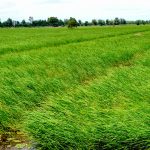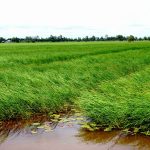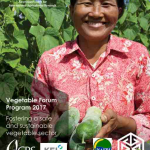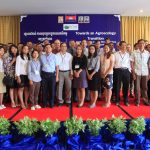5 downloads
Title of document: National Multi-stakeholder Workshop on Agroecological Transition Authors: Stephen Rudgard Journal’s name if any: Ministry/Government Agency/Organisation: ACTAE, CANSEA, SAVE AND GROW, FAO Year of publication: 2016 Geographic focus: Lao PDR Main issues / topics addressed (for example: Save and Grow-SIRP improved management practices promoted in Farmers Field Schools, Field Experiment Design ……) School of agroecology (if any): Web address to original document (if any): http://www.fao.org/ag/save-and-grow/ Summary: The main of this presentation talking about Sustainable Intensification of Rice Production: Ecosystem-based Approaches. At National Multi-stakeholder Workshop on Agroecological Transition in Vientiane, 2 - 3 June 2016 Read More
6 downloads
Title of document: Proceedings of the regional workshop: Towards a regional initiative to develop E-learning resources in Agroecology - Phnom Penh, Cambodia, 11th of October 2017 Authors: Florent Tivet Ministry/Government Agency/Organisation: ACTAE/CIRAD_GRET Year of publication: 2017 Geographic focus: Mekong Region Summary: Based on on-going activities in the field of training and higher education implemented by a range of partners within ACTAE project and beyond (see program of the event) a regional workshop was organized in Phnom Penh on October 11 2017 bringing together different partners involved in training, awareness raising and higher education. This workshop was organized on the continuity of a 1st event organized by ALISEA in Vientiane in June 2017. A diversity of participants attend the event with representatives from several universities in the region (Thailand, Lao PDR, Cambodia, Myanmar), research institutions, representatives from Ministry of Agriculture, departments of Agricultural Land Resources Management, and NGOs. The first focus of the event was on e-learning as an integrated tool between different actors and beneficiaries. Discussions were conducted prior the event one between ITC, SupAgro, RUA, Queensland University, GDA/DALRM, GRET and CIRAD to identify common expectations for this event and outputs. Read More
2 downloads
Title of document: ALiSEA experience sharing workshop: Review of existing pedagogical materials and initiatives for mainstreaming agroecology practices in Laos Authors: Pierre Ferrand, Claire Georges, Hongnapha Phommabouth Ministry/Government Agency/Organisation: ALiSEA/GRET Year of publication: 2017 Geographic focus: Laos Summary: This experience sharing workshop is part of the activities implemented by the Agroecology Learning alliance in South East Asia (ALiSEA) to foster multi stakeholder collaborations in regards to promoting an agroecological transition. It is more especially embodied in the support provided to the Faculty of Agriculture from the National University of Laos through the ALiSEA Small Grant Facility to develop new AE pedagogical material. Their project aims at both producing an updated learning and teaching manual for Agroecology with the collaboration of the Departments of Agriculture from three other universities (Souphanouvong, Savannakhet and Champhasak) as well as revising the syllabus for agroecology courses in order to harmonize them at national level. It was expected in particular to provide an opportunity for synergizing one another’s activities. This was a great opportunity for the different participants to present and confront the outcomes of their respective projects with other initiatives in Laos and learn from their previous experiences. In addition, it was expected to establish a framework for future Agroecology trainings and pedagogical material production. Read More

20 downloads
Title of document: Presentations from the Regional Forum on Promoting Sustainable Agriculture in the Mekong Sub-Region towards Food Security, An Giang University, Vietnam 6-7 November 2017 Authors: Ministry/Government Agency/Organisation: An Giang University, ALiSEA, SEARCA Year of publication: 2017 Geographic focus: Mekong Region Summary: The Mekong Sub-region is rapidly becoming a new frontier of economic growth in Southeast Asia due to its rich human and natural capital (ADB 2017). Its suitability for a wide range of crops has made agriculture one of the sub-region’s important economic sectors. It has also led to increased trade and investment linked to regional integration. More than two-thirds of the population of the countries comprising the Mekong Sub-region rely heavily on agriculture for their livelihoods (WWF Greater Mekong). These countries are Cambodia, the Lao People's Democratic Republic (Lao PDR), Myanmar, Thailand, and Vietnam. The People's Republic of China (Yunnan Province) is a part of this sub-region but for purposes of this forum is not included. The forum aimed to share research findings from SEARCA SFRT grantees across the Mekong Sub-Region, as well as develop research to address gaps, towards the promotion of ecological farming, adaptation to climate change, and improving rural livelihoods and food security. This forum covered Seed Fund for Research and Training (SFRT) research from 2013 to 2016 where 11 out of 15 studies of Vietnamese and Myanmar grantees are relevant to the above subject (none from Cambodia, Lao PDR, and Thailand for the period). The expected participants were selected local researchers from universities in Vietnam, particularly in the Mekong Delta, SFRT grantees and SEARCA Fellows/scholarship alumni from Cambodia, Lao PDR, Myanmar, Vietnam and Thailand. It also featured research conducted by the Research Center for Rural Development (RCRD) of An Giang University under the project component Agroecology Learning Alliance in South East Asia (ALiSEA). The ALiSEA component supports activities aimed at increasing visibility and credibility of the agroecology movement, and scaling up the development and adoption of agroecological practices among farmers. Here are the presentations of the Seed Fund for Research and Training (SFRT) research from 2013 to 2016: Assessment of Impacts of and Adaptation to CC in Fisheries and Agriculture - Mac Nhu Binh Assessment of the Impact of CC to Aquaculture Fisheries Household - NTHDiep Assessment of Traditional Rice Based Farming Systems - LT Phong Climate Change Impact on Rice Production and Adaptation - Huynh Viet Khai Enhancing Marketing Capacity for Agriculture Cooperatives - QTXuan Gender roles and relationship in water management - Nguye Van Thai Impact of Rural Out-migration on the Resilience of Agricultural - Seinn Seinn Mu Promoting Sustainable Agriculture in the Mekong Sub-Region_ Ngo Thanh Son Read More

18 downloads
Title of document: Presentations from the Regional Forum on Promoting Sustainable Agriculture in the Mekong Sub-Region towards Food Security, An Giang University, Vietnam 6-7 November 2017 Authors: Ministry/Government Agency/Organisation: An Giang University, ALiSEA, SEARCA Year of publication: 2017 Geographic focus: Mekong Region Summary: The Mekong Sub-region is rapidly becoming a new frontier of economic growth in Southeast Asia due to its rich human and natural capital (ADB 2017). Its suitability for a wide range of crops has made agriculture one of the sub-region’s important economic sectors. It has also led to increased trade and investment linked to regional integration. More than two-thirds of the population of the countries comprising the Mekong Sub-region rely heavily on agriculture for their livelihoods (WWF Greater Mekong). These countries are Cambodia, the Lao People's Democratic Republic (Lao PDR), Myanmar, Thailand, and Vietnam. The People's Republic of China (Yunnan Province) is a part of this sub-region but for purposes of this forum is not included. The forum aimed to share research findings from SEARCA SFRT grantees across the Mekong Sub-Region, as well as develop research to address gaps, towards the promotion of ecological farming, adaptation to climate change, and improving rural livelihoods and food security. This forum covered Seed Fund for Research and Training (SFRT) research from 2013 to 2016 where 11 out of 15 studies of Vietnamese and Myanmar grantees are relevant to the above subject (none from Cambodia, Lao PDR, and Thailand for the period). The expected participants were selected local researchers from universities in Vietnam, particularly in the Mekong Delta, SFRT grantees and SEARCA Fellows/scholarship alumni from Cambodia, Lao PDR, Myanmar, Vietnam and Thailand. It also featured research conducted by the Research Center for Rural Development (RCRD) of An Giang University under the project component Agroecology Learning Alliance in South East Asia (ALiSEA). The ALiSEA component supports activities aimed at increasing visibility and credibility of the agroecology movement, and scaling up the development and adoption of agroecological practices among farmers. Here are the presentations of the plenary session: Development potentials for floating rice cultivation in Ayeyarwady Delta Region, Myanmar - Nilar Aung Integrating collaborative co-designed research and citizen sciences for conservation of floating rice in the Mekong Region, Vietnam - Dr. N V Kien Sarus crane, an indicator of sustainable agriculture in the Ayeyarwady Delta, Myanmar - Tran Triet Scoping Floating rice based agro-ecological farming system, Myanmar - Dr Thein Tun Trade-offs between ecosystems services in rice cropping system, Cambodia - Dr Malyne Neang Read More

21 downloads
Title of document: Presentations from the Laos Vegetable Forum 2017: Fostering a safe and sustainable vegetable sector Authors: Ministry/Government Agency/Organisation: CRS, KEI, NAFRI, ACIAR Year of publication: 2017 Geographic focus: Lao PDR Summary: In the Lao PDR, vegetable production provides around 80% of domestic demand, mostly produced by smallholder farmers. Throughout the country, there are large differences in consumption between provinces. Challenges to vegetable production include suboptimal yields, poor competitiveness, high postharvest losses, product that does not conform to quality and safety demands of consumers, limited technical capacity and difficulties in meeting market demand during some periods of the year. Additionally, the recent establishment of the ASEAN Economic Community has implications for cross-border trade regulations. Thus there are many opportunities for both producers and the private sector to benefit from improved connections and sustainability. The vegetable sector offers smallholder farmers an option to diversify their production systems and market opportunities, improve household nutrition and increase incomes for farmers and traders. Importantly, it also offers women a source of income, and can help improve household food security. As the sector develops, opportunities for market engagement, input supply and agro-processing will increase. These challenges and opportunities can be addressed in many different ways, and with a range of stakeholders. In Laos, there are public, private and development partners working to improve the productivity and profitability of the vegetable sector. Bringing these stakeholders together at a forum is a way to understand the current situation in Laos and create potential networks to foster sustainability in the sector. The Lao Vegetable Forum has been organized on 26th October, 2017 at the Crowne Plaza Hotel, Vientiane. The forum had several objectives, including to: - Highlight the latest research and development activities; - Forge networks between public, NGO and private sector professionals throughout the region working in this area for communication and collaboration; - Provide an opportunity to learn about developments in the region; and - Facilitate the exchange of ideas on sector development. In the first forum, the theme was ‘Fostering a safe and sustainable vegetable sector’. It started with an overview of the current status of the Lao Vegetable Sector. The main sessions focused on introducing different kinds of standards, and then options and examples of smallholder organisation and market arrangements. A final panel discussion was held to highlight the experiences of different kinds of stakeholders within the vegetable sector. Key themes that arised from the presentations and discussions will be synthesised and addressed in subsequent forums. Read More
1 download
Title of document: Report of the International Symposium on Agroecology in China Authors: Food and Agriculture Organization (FAO) Ministry/Government Agency/Organisation: Food and Agriculture Organization (FAO) Date: 29-31 August 2016 Location: Kunming, Yunnan, China Geographic focus: China Summary: In September 2014 the Food and Agriculture Organization of the United Nations (FAO) convened the International Symposium on Agroecology for Food Security and Nutrition. This was followed in 2015 by three regional meetings in Brazil, Senegal and Thailand. These meetings brought together stakeholders from academia, policy and civil society to facilitate better understanding of the role of agroecology in contributing to food security and nutrition. The meetings confirmed that FAO’s approach to agroecology should be based on regional and local realities as well as economic, social and environmental conditions. In order to continue to develop this regional approach a further symposium on agroecology the International Symposium on Agroecology for Sustainable Agriculture and Food Systems in China was organized by the Chinese Academy of Agricultural Sciences (CAAS), FAO, and Yunnan Academy of Agricultural Sciences (YAAS), with the support of the Government of France. Read More
20 downloads
Title of document: Proceedings of the National Thematic Workshop on "What performance Indicators for Assessing Agroecology Impacts ?" Authors: Pierre Ferrand and Dr. Saythong Vilayvong Ministry/Government Agency/Organisation: ALiSEA Date: 29th November 2016 Location: LANITH, Vientiane, Laos Geographic focus: Laos Summary: Agro-ecological approaches are seen as convincing and evidence-based alternatives towards sustainable agriculture. They clearly aim at strengthening innovation capacity of family farms, as well as the recognition of their contribution to food sovereignty in the region. They cover technical, economic, societal and policy dimensions of agricultural production respectful of environment. They also contribute to poverty alleviation, food security, climate change mitigation and adaptation However, relying on conventional metrics to measure the performance of farming systems, it is hard to make the case for agroecology. To understand the impact of agroecology requires assessing the performance through a different lens. This report presents the main findings of the discussions held during the 1 day workshop addressing performance indicators for agroecology impacts in Vientiane, Laos, on the 9th of November 2016. Read More

24 downloads
Title of document: Profiles of participants attending the multi stakeholder workshops on agroecological transition in the Mekong Region Authors: ALiSEA Team Ministry/Government Agency/Organisation: ALiSEA Year of publication: 2016 Geographic focus: Cambodia, Laos, Myanmar & Vietnam Summary: These 4 documents compile short biographies and contact details of most of the participants who have attended the 4 national multi-stakeholder workshops addressing Agroecological Transition in the Mekong Region organized between March and June 2016 (Myanmar, Cambodia, Vietnam Lao PDR). Read More

29 downloads
Title of document: Consolidated account of the 4 national multi stakeholder workshops on agroecological transition in the Mekong Region Authors: Pierre Ferrand Ministry/Government Agency/Organisation: ALiSEA Year of publication: 2016 Geographic focus: Cambodia, Laos, Myanmar & Vietnam Summary: This report presents a short consolidated account of 4 national multi-stakeholder workshops addressing Agroecological Transition in the Mekong Region and bringing together 225 participants that have been organized between March and June 2016 (Myanmar, Cambodia, Vietnam Lao PDR). Such workshops aimed at sharing knowledge, information and actions between agricultural development stakeholders. Read More

 Asia & Mekong Region
Asia & Mekong Region  Cambodia
Cambodia  Laos
Laos  Myanmar
Myanmar  Other
Other  Vietnam
Vietnam